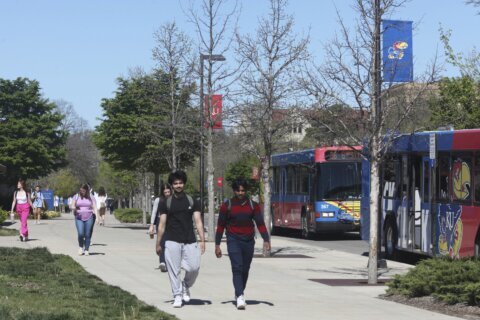INDIANAPOLIS (AP) — Indiana Republican lawmakers on Tuesday narrowly advanced a plan to ban nearly all abortions in the state, despite opposition from abortion-rights supporters, who say the bill goes too far, and anti-abortion activists, who say it doesn’t go far enough.
Indiana has one of the first Republican-run state legislatures to debate tighter abortion laws since the U.S. Supreme Court last month overturned Roe v. Wade. Its debate comes amid an evolving landscape of abortion politics across the country as Republicans face some party divisions and Democrats see a possible election-year boost.
The U.S. Supreme Court formally issued its judgment Tuesday in the June 24 Dobbs v. Jackson ruling — a step that allows some state trigger laws to ban abortion to take effect.
In Indiana, chants from anti-abortion activists, such as “Let their heart beat,” could be heard inside the Senate chamber as a committee wrapped up two days of testimony during which none of the more than 60 people speaking voiced support for the Republican-sponsored bill. Indiana Right to Life, the state’s most prominent anti-abortion group, organized a rally that drew several hundred protesters to the Statehouse, and the group’s president, Mike Fichter, warned that conservative lawmakers need to act or explain themselves to voters in November.
A national poll taken this month found overwhelming majorities believe their state should generally allow abortion in specific cases, including if a pregnant woman’s life is endangered or if the pregnancy is the result of rape or incest. Few think abortion should always be illegal, according to The Associated Press-NORC Center for Public Affairs Research poll.
Indiana’s measure would prohibit abortions from the time a fertilized egg implants in a uterus with limited exceptions — in cases of rape, incest and to protect the mother’s life. Abortion-rights supporters object to the bill’s tighter restrictions on the procedure, while abortion opponents say it’s too lenient with its exceptions and lacks enforcement teeth.
A top legislative Republican, Senate Majority Leader Mark Messmer, voted against the measure, lamenting the “near impossibility of threading the perfect needle” on the issue during a short special legislative session that GOP Gov. Eric Holcomb originally called to address a tax rebate plan. He has not said whether he supports the abortion ban that’s being discussed.
In West Virginia, the Republican-dominated Legislature rejected for the second time in two days efforts by Democrats to add exceptions for rape and incest victims to a bill banning abortion in almost all cases. It would make performing the procedure a felony punishable by three to 10 years in prison.
The Indiana proposal followed a political firestorm over a 10-year-old rape victim who traveled to the state from neighboring Ohio to end a pregnancy. The case gained attention when an Indianapolis doctor said the child had to come to Indiana because a newly imposed Ohio law bans abortions if cardiac activity can be detected in an embryo or fetus, possibly as early as six weeks of pregnancy.
Such abortions would still be allowed under the Indiana proposal, though lawmakers voted Tuesday to limit how long rape and incest victims have. Those 16 or older could get an abortion until eight weeks of pregnancy, while people younger than 16 would have until 12 weeks.
The committee voted 7-5 in favor of the ban after also adding provisions under which doctors could face felony criminal charges and up to six years in prison for performing an illegal abortion. That’s the same potential penalty for performing abortions under Indiana’s current 20-week ban.
The American Civil Liberties Union of Indiana, which has sued over previous abortion restrictions, said the ban would endanger women.
“Indiana legislators are putting the health and safety of Hoosier women at risk, and again surrendering to the demands of a small group of anti-abortion extremists,” said Katie Blair, the organization’s advocacy director.
Cathie Humbarger, a longtime leader of the Fort Wayne-based Right to Life chapter, also opposes the bill — for very different reasons.
“It is totally unenforceable and as such renders it basically worthless,” Humbarger told the committee. “You can, and must, do better.”
More amendments to the bill could be debated by the full Senate on Thursday.
Indiana Republican Senate President Pro Tem Rodric Bray said lawmakers were struggling to deal with issues they hadn’t faced before Roe v. Wade was overturned.
“We’re working in earnest to try and find a path forward, listening to everybody that’s out there,” Bray said.
Elsewhere Tuesday, a South Carolina judge denied a request to temporarily block enforcement of that state’s six-week abortion ban. Planned Parenthood South Atlantic and other plaintiffs had asked the judge for an injunction while courts determine whether the law violates the state constitution.
And in Louisiana, a judge rejected a request from state officials to lift his order blocking a ban while they pursue an appeal. That means abortions remain accessible in that state.
__
Arleigh Rodgers is a corps member for the Associated Press/Report for America Statehouse News Initiative. Report for America is a nonprofit national service program that places journalists in local newsrooms to report on undercovered issues. Follow Rodgers on Twitter at https://twitter.com/arleighrodgers
Copyright © 2024 The Associated Press. All rights reserved. This material may not be published, broadcast, written or redistributed.







